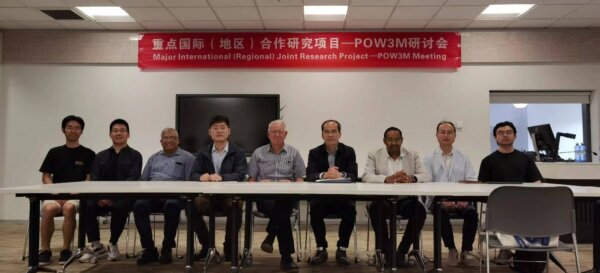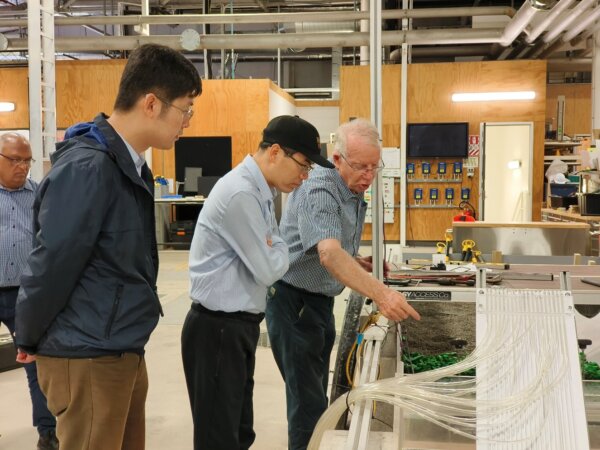From January 23 to February 1, 2024, the team led by Professor Jinhai Zheng (project leader) including Professor Dawei Guan and Professor Rui He, visited the University of Auckland. During the visit, the project team held The Key International Cooperation Fund Project of National Natural Science Foundation of China (51920105013) “Research on the Protection Mechanism of Microbial Reinforcement of Large Diameter Monopile Foundations under Complex Dynamic Environmental Conditions (POW3M)” annual work seminar for 2023 at the Faculty of Engineering, University of Auckland, both online and offline.
The seminar was attended in person by project leader Professor Jinhai Zheng, international cooperation experts from the University of Auckland including Professors Bruce Melville, Naresh Singhal, and Assad Shamseldin, project principals Professor Dawei Guan and Professor Rui He, and doctoral students from the University of Auckland involved in the project research. Professor Yee Meng Chiew from Nanyang Technological University in Singapore, Professor Dong-Sheng Jeng from Griffith University in Australia, project principal Professor Jisheng Zhang, and Professor Liang Cheng from Jiangsu University along with their students participated online. The project team extensively exchanged insights on four research topics: “Mechanisms of microbial reinforcement of saturated marine in-situ sand and optimization of grouting processes,” “Mechanism of microbial solidification of monopile foundations under complex dynamic loads,” “Influence of microbial reinforcement on the strength and stiffness of monopile foundations,” and “Optimization of protection methods for large diameter monopile foundations under complex dynamic loads.” They established research plans and work schemes for the next year, laying a solid foundation for the smooth progression of research work in 2024. Additionally, the project team visited the hydraulics laboratory at the University of Auckland and conducted typical condition tests for microbial reinforced pile foundation scour resistance.
This year marks the fourth year of the project, with major activities including optimizing the MICP grouting solution and process, studying the impact of magnesium ions on the efficiency of microbial mineralization and the mechanical properties of reinforced sand under marine conditions, proposing a rapid solidification process for active magnesium oxide microbial mineralization. Experiments on pile foundation scour under unprotected conditions and the combined action of vibration and wave-current were conducted, as were anti-scouring experiments on MICP reinforced bodies, studying the anti-scouring effects and mechanisms of MICP protection bodies under clear water and live bed conditions. The project clarified the mechanisms by which microbial reinforcement and the edge scour pits affect the strength and stiffness characteristics of large diameter monopile foundations, determined the effects of shallow reinforcement under various parameters on the initial stiffness of large diameter monopiles, and optimized the direct grouting method for model scale pile foundations. The accuracy of the tidal scour mathematical model was verified, multi-scale nested simulations of water and sediment movement around single pile foundations under real tidal conditions were conducted, and the scour protection effects of microbial reinforcement on single pile foundations and the impact of scour pits on the wave-pile-seabed coupling calculation were analyzed. With the support of this project, 6 papers were published, 3 invention patents were granted, and 5 doctoral and 8 master students were trained this year. The project team received 2 academic awards, including the Second Prize of the China Ocean Engineering Science and Technology Award for “Simulation and Prediction of Scour around Engineering Foundations under Complex Coastal Dynamic Environments and Anti-Scour Reinforcement Methods” and the Outstanding Paper Award for Sediment Research from the World Association for Sedimentation and Erosion Research. Two “Project Progress Seminars” were organized, and members attended 8 academic conferences domestically and internationally. The project’s main partners, Hohai University and the University of Auckland, jointly hosted the 1st IAHR International Workshop on Scour around Hydraulic and Coastal Structures.


